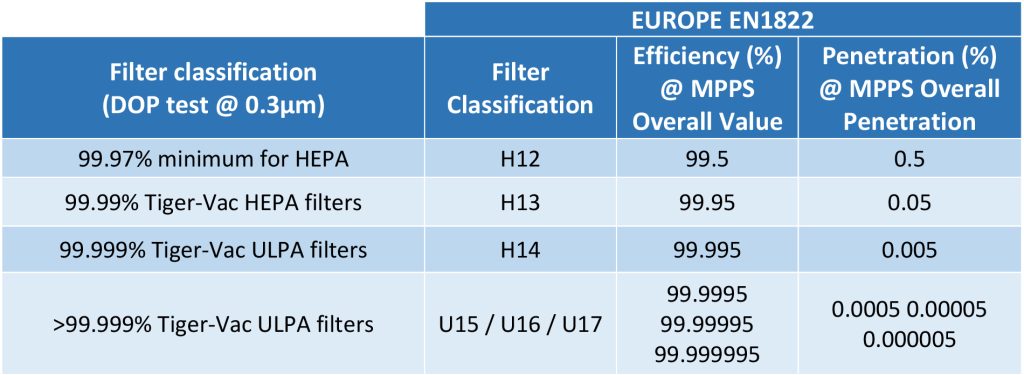
Under the Spotlight – UV Lights in Safety Cabinets
November 16, 2022
How will the Annex 1 revision impact you and your Microbiological Safety Cabinets?
June 30, 2023 What’s the difference between HEPA and ULPA filters? It’s more than just spelling.
What’s the difference between HEPA and ULPA filters? It’s more than just spelling.
Which filter should you choose for your microbiological safety cabinet? The filter is the biological beating heart of a microbiological safety cabinet, aka MSC, and understanding the similarities and the differences between HEPA and ULPA filters aids in selecting the filter which offers the best combination of performance and capability for laboratory personnel.
An MSC is an important piece of any laboratory equipment purchase, in its capacity for handling low to moderate risk biological materials. The filter’s prime purpose is to remove airborne particles before the air is returned into the work surface; some of these particles are viruses, spores, and bacteria, it is worth noting that neither filter will not trap gas molecules.
You can employ the following method for selecting the correct filter type i.e., following the 3 key factors within the European EN1822 guidelines in conjunction with consideration of the intended use of the filter.
1: Level of Filtering
The level at which filtering needs to work is the most important factor in choosing a safety cabinet - the main purpose of a HEPA or ULPA filter is personnel safety and protection of the product. An ULPA filter will remove particles with greater efficiency than a HEPA filter of the same dimensions. However, the degree filtration necessary depends on the type of work carried out in your MSC.

For most biological applications, HEPA offers more than the adequate filter efficiency to protect the operator and prevent cross contamination.
2: Filter Standard
Choose a filter that meets the appropriate standard for your MSC. The following table gives a brief overview:
3: MSC Design
The difference in the amount of air that can pass through an ULPA vs HEPA has significant impact. The design, manufacturing, and operation of a MSC will impact amount of airflow necessary to maintain the correct amount of negative pressure within the unit. ULPA slows the airflow more compared to a HEPA.
To maintain the same airflow and resultant protective measures of the cabinet when using ULPA, one of three things must happen, the size and/or depth of the filters are increased, or the power of the fans increased.
In Conclusion
The choice whether to install HEPA or ULPA filters into your MSC(s) needs careful consideration subject to its core application. HEPA filters meet or exceed the filtration level needs for most biological work conducted using a MSC and since HEPA filters allow more air to pass through than ULPA, a HEPA will take longer to reach its maximum load capacity, resulting in a prolonged life.
ULPA filters provide no additional advantage for researchers and are more employed in the semiconductor electronics industry as well as C02 incubators. ULPA filters are rarely used due to cost and increased resistance - hence increased noise. However, they do offer over 99.9995% filtration efficiency at the most penetrating particle size, so do offer benefits too.
If you consider what you use your MSC for, and the level of filtration needed, you will be able to select the correct filter with confidence. Alternatively, you can ask for guidance from a trusted source service provider, such as Crowthorne Group, via www.crowthornehitec.co.uk. For information on Faster MSCs and other airflow products, click here to contact one of our product specialists.
